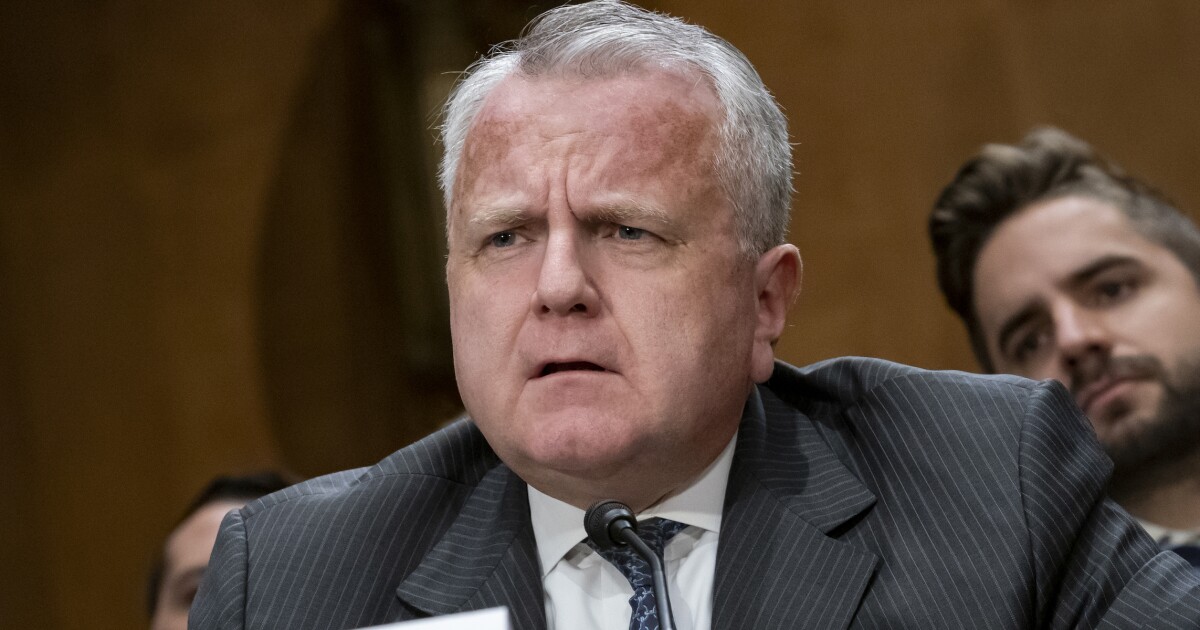

The difference between Russia‘s and the United States’s judicial systems is a major factor in negotiations to release Americans detained by Moscow, former U.S. Ambassador to Russia John Sullivan believes.
Sullivan led the embassy from February 2020 through this past September, which includes President Joe Biden agreeing to a prisoner swap to secure former U.S. Marine Trevor Reed his freedom and the wrongful detentions of WNBA superstar Brittney Griner and Paul Whelan on drug and espionage charges, respectively.
FOUR YEARS LATER, BROTHER SPEAKS OUT ON PAUL WHELAN’S IMPRISONMENT IN RUSSIA
“It’s an asymmetry. The Russians are able to arrest, convict, [and] sentence Americans without an independent judiciary, and they can do it on a whim. They did it with Trevor Reed. They did it with Brittney Griner,” he told the Washington Examiner in an interview.
“Given the Russian government’s control over their judiciary and their legal system, it is really the security services,” he added. “They can take that conduct which is not criminal, make it criminal, give somebody a lengthy prison sentence and then turn to the United States and say here’s what we want in return for releasing your unjustly detained American. It’s an asymmetry because we believe in the rule of law and we want our American citizens treated fairly and we want to get them out.”
Earlier this month, Biden agreed to exchange convicted Russian arms dealer Viktor Bout for Griner, whom the administration considered wrongfully detained after she was arrested and charged with bringing vape cartridges that contained minimal amounts of marijuana last February. Griner had been sentenced to nine years in prison and was in a penal colony at the time the deal was agreed upon. He also freed Reed in a prisoner swap for convicted Russian drug smuggler Konstantin Yaroshenko last April.
But both deals left Whelan behind, and following the Griner deal, administration officials revealed the Kremlin viewed Whelan differently due to the espionage charges levied against him and of which he was convicted, despite his repeated denials. Sullivan confirmed that the Kremlin’s attitude toward the Michigan security adviser had been long-standing.
“The Russians have been consistent in how they have characterized Paul Whelan as a spy. He was charged and convicted of espionage,” he explained. “The consequence of that has become clear, that the United States is engaged in discussions with the Russians about trying to get Paul released. The Russians have now said that because Whelan is a spy, we expect an equivalent person or persons in trade for him, and that’s why it was easier, I think, for deals to be made for Trevor Reed and Brittney Griner.”
Sullivan, during his time as ambassador, said Whelan “was subjected to a secret trial” in which he was convicted and sentenced to 16 years in a penal colony based on “secret evidence,” and he noted in the interview that Whelan was arrested by the Federal Security Service and tried behind closed doors, which was different than both Griner’s or Reed’s case.
“Paul was arrested at the very end of December of 2018, when I was deputy secretary of state,” Sullivan continued. “I remember the day he was arrested. I was in my office in the department, as was Secretary [of State Mike] Pompeo, when we spoke to each other and said, you know, that this was a bad thing that American citizen had been arrested and that the Russians at the time and have continued to try to make the case that Paul is somehow a spy. He’s not.”
Earlier this month, State Department spokesman Ned Price told reporters that U.S. officials “have had direct conversations with Russian officials regarding Paul Whelan,” though it’s unclear whom the Kremlin may seek in another swap after already securing Yaroshenko’s and Bout’s releases.
“Everything we have proposed, they’ve rejected, and it’s been a substantial list of either, you know, I probably can’t get into more detail on that, but trust me — there wasn’t a substantial amount of effort put into trying to try to come up with proposed bargains for a trade for these wrongfully detained Americans,” he continued. “What the Russians have done, the Russians have said there are only a few individuals — Viktor Bout, his former pilot Yaroshenko, who was traded for Trevor Reed — they were the ones who said to us, you’re wasting your time giving us names of people, we’ll tell you what the deal is. And that’s the way they approach it.”
CLICK HERE TO READ MORE FROM THE WASHINGTON EXAMINER
While Whelan is now the most notable American detained in Russia, he’s not the only one. A U.S. official told the Washington Examiner in the aftermath of the Griner swap that they also tried to bring Pittsburgh native Marc Fogel, who was arrested in August of last year, like Griner, for attempting to enter Russia with medical marijuana. Fogel was sentenced to 14 years in prison. Sullivan described it as “a tragic case” and said he believes there’s “a strong case to be made that he, himself, is wrongfully detained” in Russia, which is a legal definition as outlined in the Robert Levinson Act that Congress passed in 2020.
Sullivan announced earlier this month that he is rejoining the Mayer Brown law firm that he previously worked at before his latest government posts.







